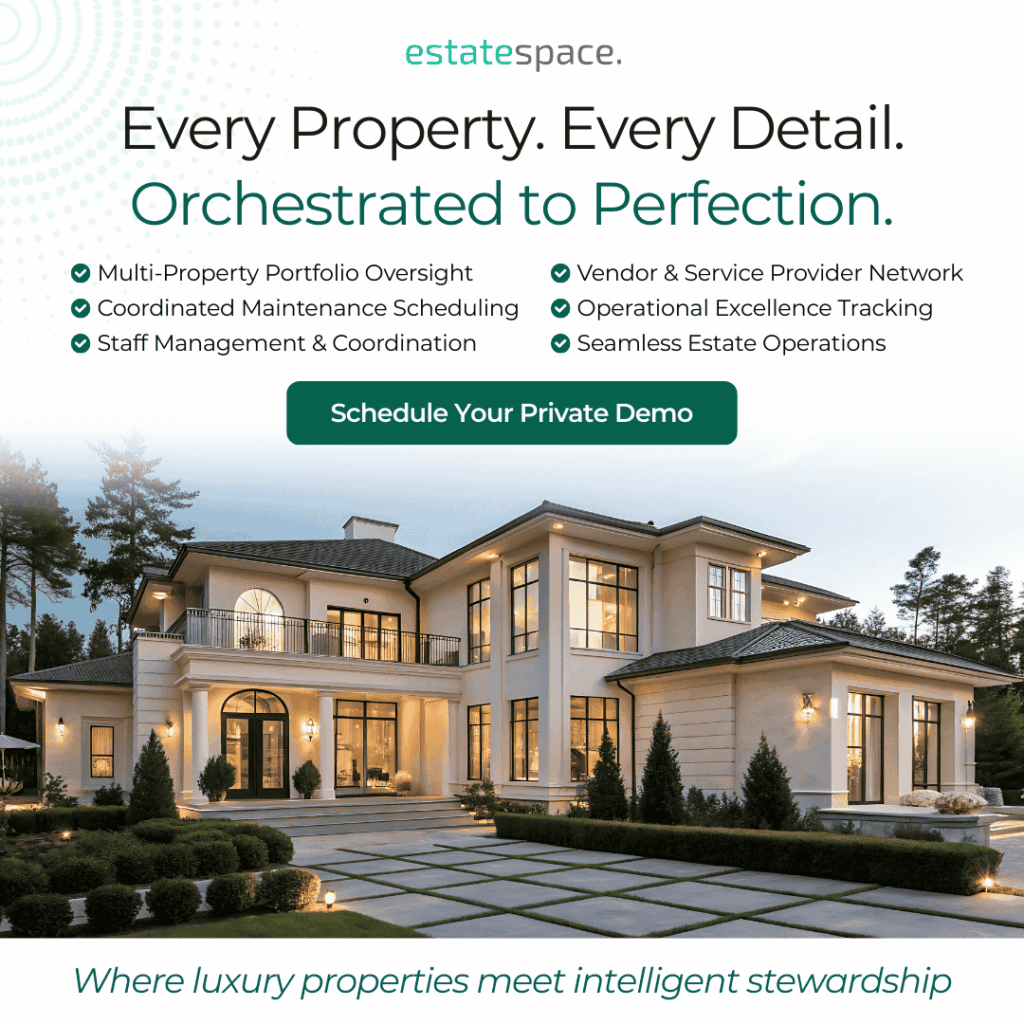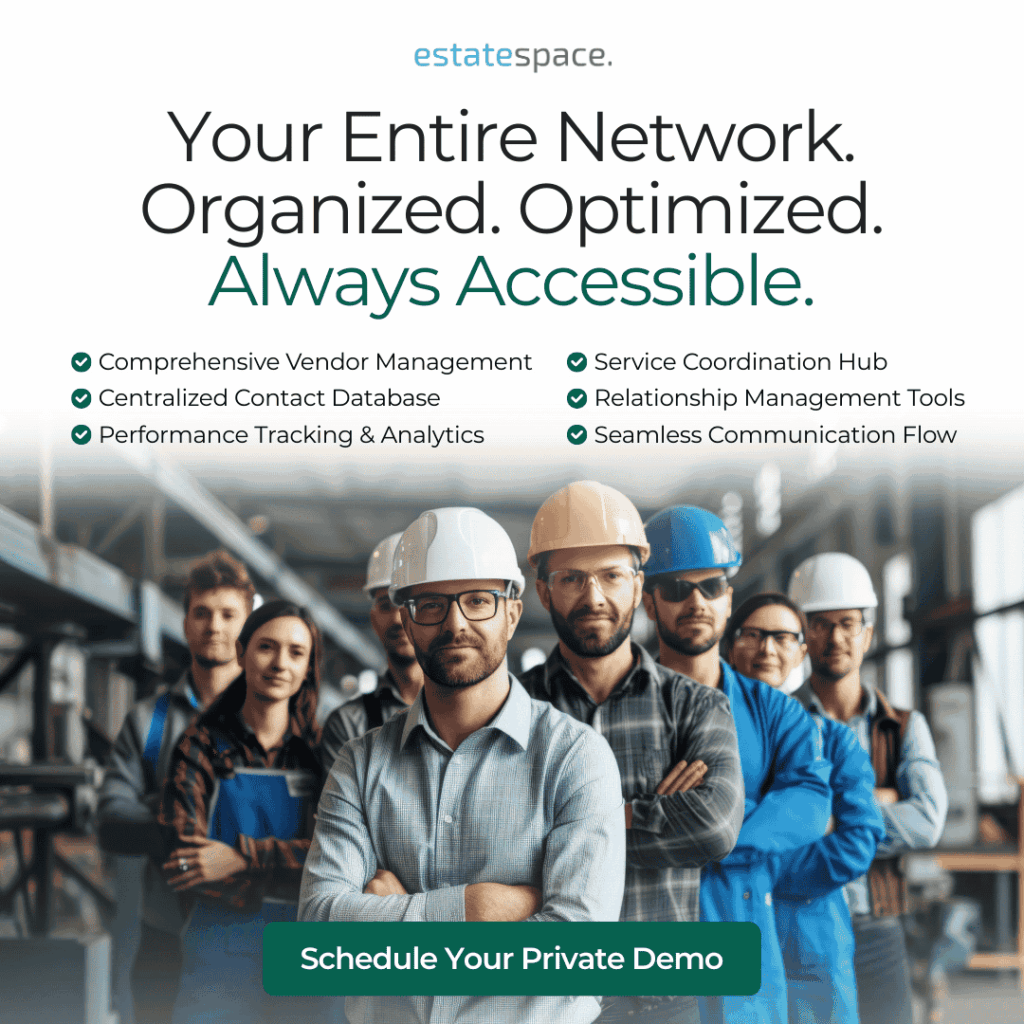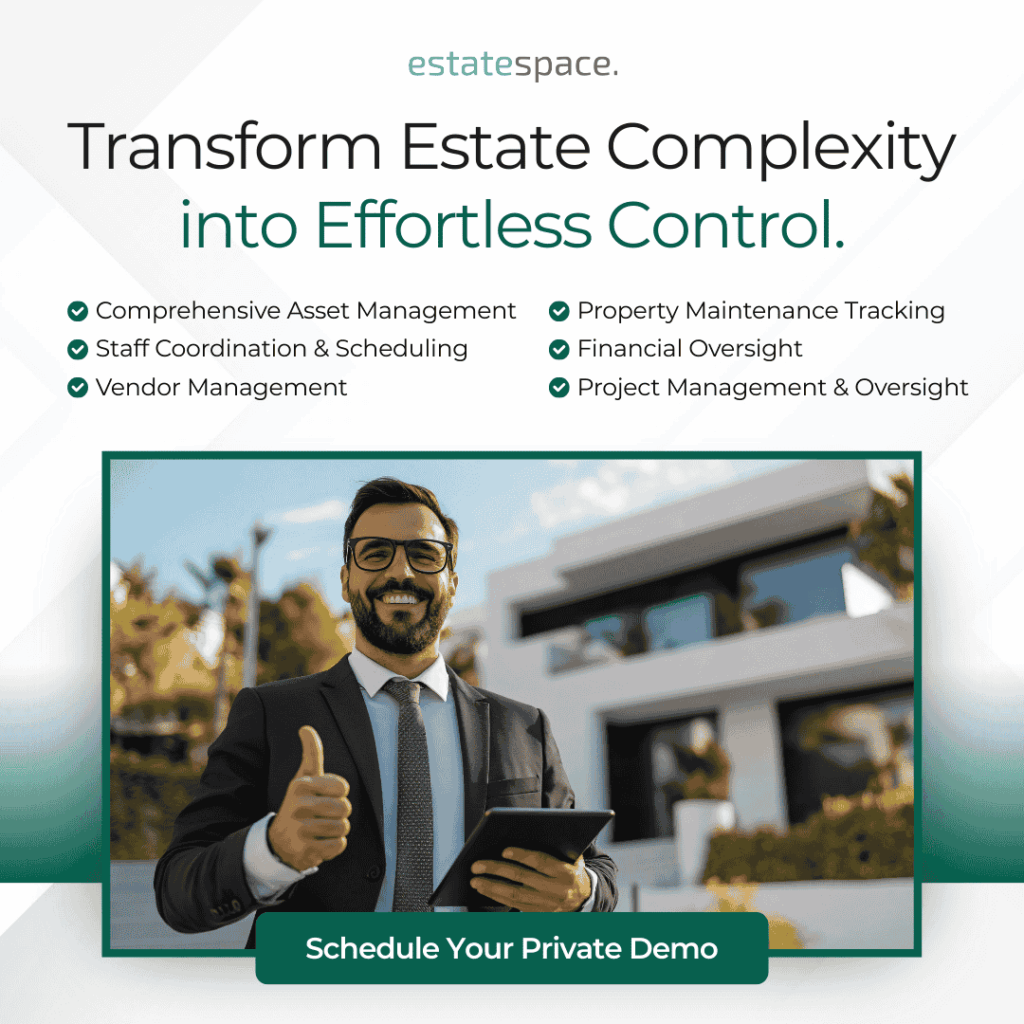Property Management Budget Software: Moving Beyond Spreadsheets for Strategic Estate Financial Planning
Reconciling vendor invoices at 11 PM while toggling between three different Excel versions isn’t strategic estate management—it’s spreadsheet survival. Fortunately, property management budget software can transform how you plan, track, and report on your estates’ financial health.
Managing exceptional properties requires more than basic spreadsheets. Furthermore, you’re stewarding irreplaceable assets, coordinating complex vendor relationships, and providing institutional-grade reporting to sophisticated owners. As a result, the traditional tools most property managers rely on simply weren’t built for estates with custom infrastructure, seasonal usage patterns, and multi-asset portfolios spanning real estate, yachts, aircraft, and art collections.
Why Estate Budget Software Beats Spreadsheets
Most property managers start with Excel because it’s familiar and accessible. However, for luxury estates, spreadsheets create more problems than they solve.
The Hidden Costs of Manual Budget Management
Your property isn’t typical. Custom HVAC systems don’t follow standard replacement schedules. Similarly, imported materials require specialized vendors with unpredictable lead times. Moreover, yacht maintenance follows different rhythms than real estate. Consequently, these complexities demand property management budget software designed for high-value assets, not residential apartments.
Your owners expect precision. For instance, family office principals who track their investment portfolios in real-time wonder why they can’t see the same visibility into their physical assets. According to Forbes, effective property management budgeting requires moving beyond basic accounting to create comprehensive strategies that anticipate needs while maximizing asset value.
Your time is finite. In fact, one estate manager told us: “I spent two days tracking down a $3,000 discrepancy that was a cell reference error. Meanwhile, I missed scheduling a critical HVAC inspection that led to a $15,000 repair.”
Common Spreadsheet Pain Points in Budget Planning
The limitations of spreadsheet-based property management budget software include:
- Version chaos when multiple stakeholders need access
- Formula breaks that cascade through entire budgets
- Manual data entry consuming hours weekly
- No real-time updates or mobile access
- Disconnected systems requiring constant reconciliation
- Limited visualization when owners want insights, not cells
Fortunately, modern property management budget software eliminates these friction points while providing capabilities Excel never could.
What Strategic Budget Software Provides for Property Management
Purpose-built property management budget software transforms financial planning from administrative burden to strategic advantage.
Core Budget Management Capabilities
Automated expense tracking categorizes costs as they occur. Specifically, when vendor invoices arrive, the system recognizes patterns, suggests budget categories, and flags anomalies—no manual entry required.
Integrated vendor management provides complete visibility into spending. Therefore, you can track performance, compare pricing, manage approvals, and maintain service histories all in one place.
Predictive maintenance planning connects asset lifecycles to budget forecasts. As a result, the software warns you months in advance when major expenses approach, with cost estimates based on current market data.
Real-time reporting generates owner insights without manual compilation. Additionally, customizable dashboards provide operational detail for managers and executive summaries for owners.
AI-driven insights identify spending patterns, seasonal trends, and optimization opportunities you might miss manually. In other words, the technology learns from your property’s history and industry benchmarks.
Learn more about how EstateSpace’s property management budget software works.
Property Management Budget Software Planning Tools
Effective property management budget software supports planning beyond annual cycles:
Five-year capital projections model upcoming system replacements. Consequently, this helps you visualize expenses and plan cash reserves appropriately.
Rolling quarterly reviews adapt to market changes, vendor pricing shifts, and evolving usage patterns. Furthermore, they don’t require complete budget rebuilds.
Contingency reserves calculated based on property age, system condition, and historical patterns—not arbitrary percentages.
Seasonal adjustments incorporate predictable patterns like summer pool maintenance and winter heating costs. Instead of treating them as variances, you build them into projections.
Building Effective Budget Timelines with Software Solutions
Structure creates consistency and reduces stress during budget season. Meanwhile, property management budget software makes following this rhythm seamless:
90 days before year-end: First, conduct comprehensive property assessments. Your software should compile historical data, maintenance records, and vendor feedback automatically.
60 days out: Next, draft projections based on system-pulled actuals and upcoming needs. Modern software generates baseline budgets from prior years with suggested adjustments.
45 days out: Then, present preliminary budgets to stakeholders. Create scenario models showing impacts of different spending levels or timing decisions.
30 days out: After that, finalize budgets with revision history tracked automatically, demonstrating how feedback was incorporated.
Quarterly: Subsequently, conduct focused reviews with automated variance analysis highlighting trends requiring attention.
Monthly: Finally, quick dashboard reviews catch issues early while they’re manageable.
This approach works particularly well for family office property management where multiple stakeholders need visibility.
Solving Vendor Invoice Management with Budget Software
One of the most persistent frustrations in estate budgeting gets little attention: vendor invoice management. Fortunately, property management budget software transforms this from reactive chaos to strategic process.
Common Invoice Pain Points in Property Budget Management
Timing inconsistencies make cash flow planning difficult. Specifically, vendors bill on completely different schedules, making it impossible to predict when costs hit your budget.
Scope creep occurs when additional work happens without clear authorization or pricing discussion. As a result, you’re left to determine legitimacy and explain costs to owners.
Documentation gaps prevent you from verifying what was done, who authorized work, or why costs exceeded estimates.
Payment tracking across multiple properties and vendors creates confusion about whether invoices were already paid.
The Property Management Budget Software Solution
Strong vendor management features in budget software include:
- Standardized invoice portals where vendors upload documentation in consistent formats
- Digital approval workflows with automated routing based on authorization thresholds
- Performance tracking identifying reliable partners and pricing trends
- Spend analytics showing where money goes and identifying optimization opportunities
In fact, this systematic approach often uncovers 10-15% cost savings through better vendor relationships and elimination of unnecessary services.
Professional asset managers use sophisticated software to deliver vendor management their clients expect.
Building Owner Trust Through Budget Software Transparency
Property management budget software designed for luxury estates facilitates the transparent communication that builds trust with sophisticated owners.
Reporting That Resonates with Budget Software
Visual dashboards tell stories through trend lines showing cost reductions. Additionally, charts illustrate seasonal patterns, and comparisons demonstrate preventive maintenance value.
Proactive expense conversations happen months in advance. For example, when software shows a system has two years of expected life, you start replacement discussions on the owner’s timeline, not under emergency pressure.
Variance explanations backed by data show exactly why spending differed from projections. Moreover, supporting documentation is accessible instantly.
Strategic recommendations compare options with cost implications. For instance: “Replace this system now for $85,000, or wait two years and likely pay $110,000 plus a 30% emergency premium. Here’s the reliability data informing this recommendation.”
According to Sierra Interactive’s research on real estate management, property managers who leverage keyword research tools and data-driven approaches see significantly better results in connecting with clients 95 Real Estate Keywords You Need for Better SEO | Sierra Interactive. Similarly, the same principle applies to using data-driven property management budget software for client communication.
Planning for Emergencies with Property Budget Software
Property management budget software helps you prepare for the unpredictable through structured planning:
Emergency fund calculations based on property-specific factors like age, system condition, and historical patterns. Typically, this means 10-15% of annual operating budgets.
Specialist vendor databases maintained within your software. As a result, critical contacts and service histories are accessible during emergencies.
Pre-approved spending protocols enforced automatically by the software. However, emergency override capabilities remain available when needed.
Scenario planning tools help you evaluate repair-versus-replace decisions even under pressure. In addition, documented decision frameworks are available to reference at 2 AM.
Integrating preventive maintenance planning with your budget software improves accuracy and reduces emergency spending.
Integration: Where Property Budget Software Shines
Financial planning connects to every aspect of estate stewardship. Therefore, the best property management budget software recognizes these interdependencies:
Maintenance scheduling integration shows the ROI of prevention by connecting proactive care to budget performance. Furthermore, multi-property service management becomes dramatically easier with centralized systems.
AI-driven forecasting identifies patterns and trends you might miss manually. Consequently, this improves budget accuracy. Explore AI property maintenance assistance capabilities.
Comprehensive property assessments inform accurate budgeting by documenting actual system conditions. Learn about property assessment approaches that support better financial planning.
Portfolio-level visibility for managers overseeing multiple properties provides consolidated reporting. At the same time, it maintains property-level detail. Read about achieving estate management clarity.
The EstateSpace Property Management Budget Software Advantage
Traditional property management budget software was designed for residential apartments and commercial buildings. However, high-value estate management requires purpose-built technology.
EstateSpace provides property management budget software specifically for luxury assets—real estate, yachts, aircraft, art, and jewelry. In particular, capabilities include:
- Automated vendor invoice processing and approval routing
- Asset lifecycle tracking with replacement alerts and cost forecasting
- AI assistance identifying spending patterns and optimization opportunities
- Mobile access for approvals from anywhere
- Integrated communication maintaining complete decision records
- Portfolio-level consolidation across diverse asset types
In fact, estates using EstateSpace’s property management budget software typically reduce administrative costs by 33%. Additionally, they identify 10-15% in spending optimizations.
For project managers, the platform seamlessly transitions construction budgets to operational budgets. Moreover, it preserves critical system information and vendor relationships.
Take the Next Step with Estate Budget Software
Signs you need better property management budget software:
- Spending 10+ hours monthly on budget administration
- Owners regularly ask questions requiring significant research to answer
- Managing multiple properties without consolidated financial visibility
- Experiencing version control issues with collaborative budgeting
- Concerned about budget decisions when you’re unavailable
- Looking backward at what happened instead of forward at what’s coming
Schedule a conversation with our team to see how purpose-built property management budget software transforms estate financial planning. As a result, you’ll reduce administrative burden while providing institutional-grade insights to property owners.
Key Takeaways
The Challenge: Spreadsheet-based budgeting creates version control chaos, formula errors, manual data burden, and missed opportunities for proactive financial management of luxury properties.
The Solution: Purpose-built property management budget software automates tracking, integrates vendor management, enables AI-driven predictive planning, and provides real-time insights. Consequently, this reduces administrative costs up to 33%.
The Outcome: Transform from reactive administration to strategic stewardship. In addition, build owner trust through transparency while reclaiming time for high-value work protecting exceptional estates.
Ready to transform your estate financial planning? Contact EstateSpace to see property management budget software built specifically for luxury asset management.






